by Carl Pyrdum
on January 13, 2012
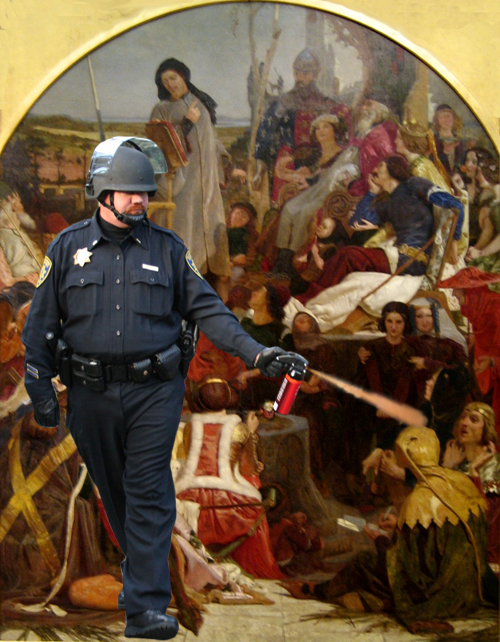 I feared I might have missed my chance to add to the Occupy debate, but this morning BoingBoing brought news that a judge has ordered the barriers removed from Zucotti Park, and protesters have returned. ((The first draft of this post originally had a self-effacing footnote here about how pathetic it was to get one’s news from BoingBoing, but so far (and it’s just after noon EST as I revise this footnote) the news has not made the front page at the NYTimes, Fox, CNN, or MSNBC.)) It would be customary for a medievalist blogger to beg apology for drifting off topic and into contemporary politics–but screw that. The way the debate has to this point been framed by Occupy’s opponents deserves the adjective I so often decry when used pejoratively by the press: medieval.
I feared I might have missed my chance to add to the Occupy debate, but this morning BoingBoing brought news that a judge has ordered the barriers removed from Zucotti Park, and protesters have returned. ((The first draft of this post originally had a self-effacing footnote here about how pathetic it was to get one’s news from BoingBoing, but so far (and it’s just after noon EST as I revise this footnote) the news has not made the front page at the NYTimes, Fox, CNN, or MSNBC.)) It would be customary for a medievalist blogger to beg apology for drifting off topic and into contemporary politics–but screw that. The way the debate has to this point been framed by Occupy’s opponents deserves the adjective I so often decry when used pejoratively by the press: medieval.
Put aside the question of whether “medieval” could accurately describe the things done to various Occupy protesters across the U.S., because my agenda is not so mundane as all that. ((Also because I do not wish to indulge in the use of medieval-qua-verbum that I so often decry, and because there really can’t be any argument that there’s not been an unfortunate amount of physical and mental brutality directed the protesters’ way.)) Rather, I say that the Occupy opposition’s frame narrative is medieval, because it relies upon many of the assumptions and ways of thinking that were current in England in the fourteenth century, a time we American medievalists tend to study obsessively.
[continue reading…]
{ }
by Carl Pyrdum
on January 12, 2012
Each Thursday, I’ll be stringing together some of the disconnected thoughts I’ve had about the subject of my dissertation in a feature I call “Thesis Thursday“. Length continues to be a problem, fortunately for my dissertation’s chances, if not for your chances of getting through Thursday without the risk of eyestrain. This week, at long last, features an appearance by Mr. Uther J. Pendragon himself, the actual focus of my project. Consider yourself warned once more, for
![there-be-dragons-map Here Be [Pen]Dragons](https://www.gotmedieval.com/wp-content/uploads/2012/01/there-be-dragons-map.jpg)
So far I’ve made a lot of noise about Geoffrey of Monmouth, but I worry my point may have been lost in all my enthusiastic asides. ((Which I don’t always have the good judgement to bracket off in a footnote.)) So here’s that point, which also will serve as a quick summary of the first three linked posts, ((Excluding Uther’s Christmas Knight, which would appear much later in my project, after I’ve moved from Geoffrey to introduce the second version of Arthur’s father that arises out of Robert de Boron’s response to Chretien de Troyes’ anxiety about Geoffrey’s Arthurian origins.)) for those joining my series late:
The first guy who tried to write a life history of King Arthur, Geoffrey of Monmouth, fashioned a larger history of the entire island of Britain out of bits stolen shamelessly from everywhere he could in order to find a way to contain the cultural capital that had accrued around the name Arthur by the beginning of the twelfth century. The History of the Kings of Britain was designed as a vehicle by which to transfer that capital to the highest Anglo-Norman noble or ecclesiastical bidder, those who ruled Britain’s multiply conquered ‘native’ British peoples who were, not coincidentally, also the main source of said cultural capital. In return for his effort (and in return for this story we now find so amazing and compelling), poor Geoffrey, then known as Geoffrey Arthur, was rewarded only with a backwater bishopric, a place so lackluster that rebellion and war probably kept him from ever setting foot there before he died. ((When Geoffrey was elected to the office, the bishopric had only been consecrated by the Norman kings for less than a decade. Geoffrey held the post for two years before he died, and the year after his successor was driven from it by Welsh rebels looking to strike at their Anglo-Norman lords. It was sacked and burned half a dozen times in the years that followed.))
This take on Geoffrey is, I admit, kind of anti-climactic, ((As some anonymous soprano remarked in a comment to last week‘s discussion of Geoffrey’s game.)) but that disappointed feeling and the way we respond to it are integral to the way I read Geoffrey’s History. We wish for so much more from the man chiefly responsible launching Arthur’s literary career. ((Launching it in the non-Brythonic literary world, I mean, a qualification I add in hopes of appeasing temporarily the various stripes of Celticists who no doubt consider Culhwch and Olwen (which we will speak of soon, I promise!) and the Welsh Triads to have at least as much claim on Arthur’s success.)) So amazing was Geoffrey’s ultimate success, we are rendered unwilling to accept the more pedestrian explanations, however plausible.
[continue reading…]
{ }
by Carl Pyrdum
on January 9, 2012
This week’s marginal image is found in the lower left corner of a page from a late 14th-century English breviary. ((The British Library’s MS Egerton 3277, f. 13v, to be precise. A breviary is a collection of psalms, hymns, prayers, and other religiously significant material for everyday use, most often used by clerics and others with official religious responsibilities, but layfolk had them too.)) Those in the know might bristle at my casual use of the indefinite article, as this is not just any psalter, but one likely commissioned by Humphrey de Bohun, Earl of Hereford and Essex. ((Either the seventh or eighth Earl, both of whom were named Humphrey.)) The Bohun family is important for medieval art historians as regular employers of some of England’s finest miniaturists, but the rest of the world knows them instead for their part in the historical soap opera that inspired Shakespeare’s second historical tetralogy, the plays Richard II, the two-part Henry IV, and Henry V.
When the titular king of Henry IV was still going by Harry Bollingbroke, he married a girl named Mary de Bohun, who gave him a son who would go on to become a titular king himself. This breviary may even have been Mary’s, and though she died before Bollingbroke usurped Richard, the book may have bounced around the royal households of both Henrys during all that sound and fury that Shakespeare immortalized. If only it had eyes, it would have been an eye witness to so much costume drama worthy history. Alas, no eyes, unless we count those owned by the people and beasties living in the margins.
But heck, why not ask them? What would these marginal people say if they could speak? ((I imagine it’d mostly be poop jokes, given what usually seems to preoccupy marginal people. They’re mostly just tiny illuminated Kevin Smiths and brothers Farrelly. Except with extra anuses. And anuses in places you don’t usually expect them.)) Or if you find my flight of fancy to be dangerously close to dissociative identity disorder, we could just ask this bear, who was kind enough to write his thoughts down: ((Man, that’s the longest intro to a marginal image I’ve ever written. Curse you, history, for you interesting but inconveniently intertwined factoids.))
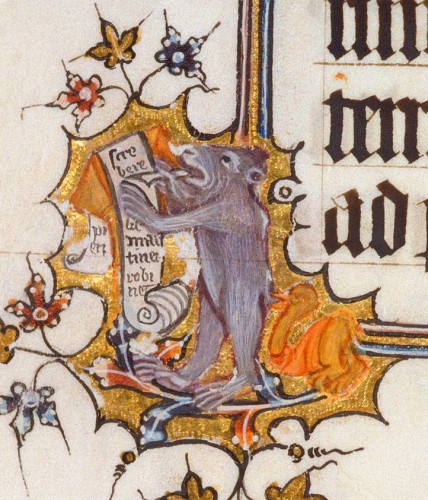
[continue reading…]
{ }
by Carl Pyrdum
on January 5, 2012
Each Thursday, I’ll be stringing together some of the disconnected thoughts I’ve had about the subject of my dissertation in a feature I call “Thesis Thursday“. I’m making up for last week’s pithy entry with a rambling one split into three pages. Forge ahead if you dare.
I’ve obliquely mentioned several times the game that Geoffrey of Monmouth was playing, the outrageousness of his fabrications and his amazing success putting them across, but I’ve not yet gone into precisely what he did. So I guess now’s as good a time as any. So let us meet this Geoffrey of Monmouth head on. We’ll get to his game as soon as we’ve finished the introductions.

I will never tire of the BBC's temporally unlikely snapshot of Geoffrey.
In part, my reticence to dive into the whole story is due to its familiarity, at least among the critical set. The vast majority of the facts that compose the scandal de Monmouth have been known for almost a century, and very little has been added to them in the last fifty. Each new generation of critics takes the scattered remnants that history has offered up about Geoffrey’s life and work, arranges them into clever and interesting patterns, some more compelling and plausible than others, and and pits the new patterns against the earlier iterations. This is not to say that good work has not been done, just that no matter how good the work, it has been done done with the same inadequate supply of raw material as the work that it’s displacing.
[continue reading…]
{ }
by Carl Pyrdum
on January 2, 2012
Happy New Year (Observed)!
In honor of the day and the new start before us, let us celebrate with some of the marginal denizens of the manuscripts I feature most often here in my weekly marginalia posts. My resolution for the year is to stop relying so heavily on these few, and maybe if they’d stop being so freaking awesome I wouldn’t have to make it a resolution. ((And as an additional resolution, I plan to revamp this recurring feature in the new year, so that related manuscript images are all linked and all the images are properly cited. I’m going to go back to the old posts and do the same. Should take a few weeks to complete, and I’ll let you know when I have.))
First up, let us check in with the good old Bodleian Alexander MS, home of the drunken monkeys who would be so appropriate to the holiday if I hadn’t already used them. Oh well, I expect the New Year’s party is already well under way in the margins of MS Bodl. 264. Ah, yes, so many pages of people dancing and drinking. Here’s just one:
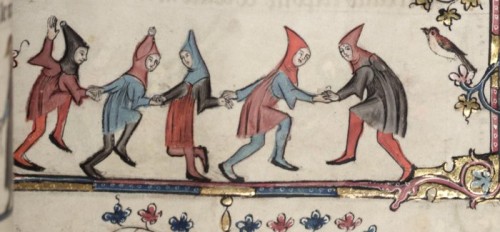
[continue reading…]
{ }
by Carl Pyrdum
on December 29, 2011
Each Thursday, I’ll be stringing together some of the disconnected thoughts I’ve had about the subject of my dissertation in a feature I call “Thesis Thursday“. This is going to have to be a shorter entry, both because the 3000 words that’s becoming my usual habit is a lot of indulgence to ask of my regular readers, and because I’ve been busy moving this week.
Let us pick back up the subject of King Arthur’s beginning, which I left in mid-thought in order to visit with Rate and Cleges last week. In doing so we find ourselves again returning to the beginning and the subject of beginnings, the subject that never seems to be able to be fully or satisfactorily brought to an ending where Arthur is concerned, no matter how skilled or thoughtful the writer or critic trying to close it down. ((While I’d like to believe there was something more than biochemical keeping me from ever moving past the beginning stages of my dissertation, I will allow myself instead only the slight comfort that comes from knowing that better writers have also had problems beginning Arthur’s story.))
Though he sits a touch removed from the period covered by my dissertation, consider the case of John Milton. Arthur and Uther could hardly have hoped for a more thoughtful or skilled author to attempt an edition of their linked biographies, and that is precisely what Milton finally set about to do in the last decade of his life. In those final years, in the wake of the successes of the Paradises Lost and Regained, Milton returned to several projects he had begun and abandoned in his youth, among them a survey of British history which would, when finally published in 1670, be saddled with the unwieldy title, The History of Britain, that Part especially now called England; from the first traditional Beginning, continued to the Norman Conquest; Collected out of the antientest and best Authours thereof. [continue reading…]
{ }
by Carl Pyrdum
on December 27, 2011
There you are in the kitchen ((Of the Internet. Yes, the Internet has a kitchen.)) comparing pedagogical approaches to an obscure Middle English romance with a colleague, and TV’s LeVar Burton wanders in from the guest bedroom ((And guest bedrooms. Lots of bedrooms, actually. Half the Internet is made up of bedrooms.)) looking for some OJ:

Obligatory link to the Twitter feed for the blog here. ((Less obligatory link to my personal Twitter feed here, added for completeness’ sake.))
{ }
by Carl Pyrdum
on December 26, 2011
Usually, marginalia has nothing to do with the text on the page on which it appears. Of course, this hasn’t stopped the acolytes of Michael Camille from creating elaborate explanations of how it does, but nonetheless, meaningful textual commentary through marginalia is the exception rather than the rule. ((And if you want to fight me on it, I’ll gladly take it outside. Unless you happen to be Michael Camille himself, in which case–Zoinks! A ghost! Run, Scoob! *sounds of feet spinning and legs pumping as runner remains in one place*)) Still, as a textual scholar first, I’m always happy to find exceptions, and here’s a nice bit of jokey commentary from the margin of a 14th-century Flemish Psalter (Bodl. MS Douce 6): ((A manuscript oft featured here, which I sometimes call ‘The Bumper Book of Medieval Monkeys’.))
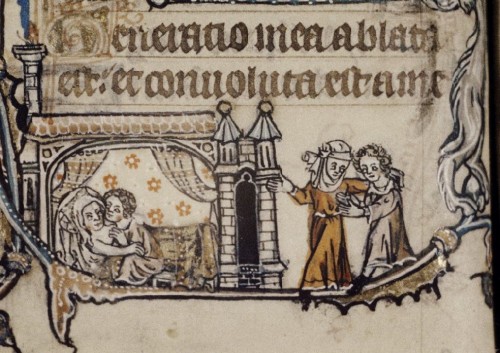
[continue reading…]
{ }
by Sir Ten-Two-Three
on December 25, 2011
Greetings, gentle readers,
I am not certain that thou hast met me afore. It is I, Sir Ten-to-Three, who once wast Baby New Year, in the year of our Lord 1023, the year in which all fairy tales you know from thine childer days traspired. Some time ago, I hadest the greatest privelege to escort the Baby New Year 19-Wonderful on his travails and adventures, and the lords of Rankin and Bass didst maketh a now neglected film aboutest it. Perhaps thou havest seenst it?
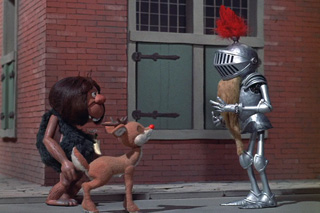
That ist me, on the righteth, afore the fire-nosed beast.
The King of This Blog, long mayest he reignest, askedethest me to droppeth by to relateth to thou the Christmas posts of years past that haveth gracest His Majesty’s blog. And whatest the hellest, itest ist not liketh Hollywood hath been knocking downst mine dooreth since; so, I said him yea.
[continue reading…]
{ }
by Carl Pyrdum
on December 23, 2011
Here we are once more, and on time, too, with the second installment of The (Bad) Medieval Movie Club and Part II of my review of Thor, conducted in association with the Bettina Bildhauer. ((Bettina Bildhauer appears courtesy of the Bettina Bildhauer Fund, LLC, and she, the fund, and its affiliates and associated stockholders disavow anything contained herein deemed offensive by any party, whether said party may be found on this Middle Yard (Miðgarðr), or on any of the other of the nine affiliated homesteads (Níu Heimar) which comprise the Norse cosmology, or in any other plane of existence found to comprise parts located either within the roots of the world tree (Mjötviðr), parallel to it and/or to its material existence, or beyond the the vale of tears through which both mortal and immortal alike may catch but fleeting glimpses. Mirror universes, particularly those where mustaches designate deviation from prime reality are exempted from all claim, except where otherwise obligated by treaty negotiated explicitly or implicitly by team of displaced heroes from prime reality during a two-part episode in which aforesaid displacees gain self knowledge of something hidden even from themselves but revealed through encounter with one or more of their mustached doubles in which a separate peace is reached. (see Nidhöggr v. Veðrfölnir, c. 1000; Spock Xtmprsqzntwlfd v. Spock Xtmprsqzntwlfd (Goatee), 2267 (stardate unknown); Phineas Doe v. Gene Forrester, 1959.) )) Be sure you’ve read the exciting part one, or this will all likely make little sense. But then that’s how this thing is going to play out no matter what you’ve read first.

[continue reading…]
{ }
 I feared I might have missed my chance to add to the Occupy debate, but this morning BoingBoing brought news that a judge has ordered the barriers removed from Zucotti Park, and protesters have returned. ((The first draft of this post originally had a self-effacing footnote here about how pathetic it was to get one’s news from BoingBoing, but so far (and it’s just after noon EST as I revise this footnote) the news has not made the front page at the NYTimes, Fox, CNN, or MSNBC.)) It would be customary for a medievalist blogger to beg apology for drifting off topic and into contemporary politics–but screw that. The way the debate has to this point been framed by Occupy’s opponents deserves the adjective I so often decry when used pejoratively by the press: medieval.
I feared I might have missed my chance to add to the Occupy debate, but this morning BoingBoing brought news that a judge has ordered the barriers removed from Zucotti Park, and protesters have returned. ((The first draft of this post originally had a self-effacing footnote here about how pathetic it was to get one’s news from BoingBoing, but so far (and it’s just after noon EST as I revise this footnote) the news has not made the front page at the NYTimes, Fox, CNN, or MSNBC.)) It would be customary for a medievalist blogger to beg apology for drifting off topic and into contemporary politics–but screw that. The way the debate has to this point been framed by Occupy’s opponents deserves the adjective I so often decry when used pejoratively by the press: medieval.![there-be-dragons-map Here Be [Pen]Dragons](https://www.gotmedieval.com/wp-content/uploads/2012/01/there-be-dragons-map.jpg)







Recent Comments